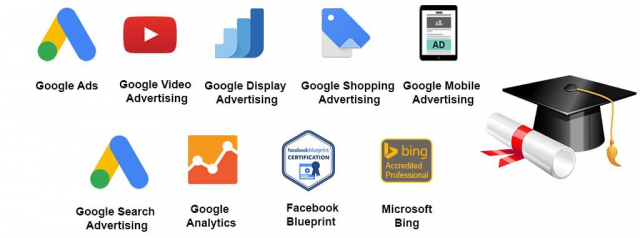Earning recognized digital marketing certifications signals expertise to employers and clients, deepens critical skills in high-demand areas, and can boost salary potential by 10–25 percent. Prioritize credentials that balance comprehensive curricula, hands-on projects, and industry recognition.
1. Google Ads Certification
Provider: Google Skillshop
Focus Areas: Search, Display, Video, Shopping, Measurement
Effort & Format: Self-paced modules (8–12 hours per specialization) plus online exams
Cost: Free
Why It Pays Off: Google Ads remains the backbone of paid acquisition. Mastery in campaign setup, bidding strategies (including Smart Bidding), audience targeting, and conversion tracking directly translates into measurable ROI improvements. Certified professionals command higher contract rates and in-house roles that drive multi-million-dollar ad spends.
2. Meta Certified Digital Marketing Associate
Provider: Meta Blueprint
Focus Areas: Meta family (Facebook, Instagram, Messenger, WhatsApp) advertising fundamentals
Effort & Format: 12–15 hours of e-learning, one 60-minute proctored exam
Cost: USD 99 exam fee
Why It Pays Off: Social advertising on Meta platforms drives a large share of consumer-facing budgets. Certification validates proficiency in campaign objectives, ad delivery optimization, creative best practices, and performance analysis. Agencies and in-house teams value Meta certification to manage billions in annual ad budgets.
3. Google Analytics Individual Qualification (GAIQ)
Provider: Google Analytics Academy
Focus Areas: GA4 implementation, reporting, analysis, data-driven attribution
Effort & Format: Self-paced, 4–6 hours plus online assessment
Cost: Free
Why It Pays Off: Data-driven optimization underpins all digital channels. Gaining deep understanding of event-based measurement, user-flow analysis, and custom reporting empowers marketers to justify budgets, uncover growth opportunities, and optimize user journeys. Certified analysts often transition into specialized analytics or growth roles with 20 percent+ salary premiums.
4. HubSpot Content Marketing Certification
Provider: HubSpot Academy
Focus Areas: Content strategy, storytelling frameworks, SEO basics, repurposing, measurement
Effort & Format: 4–6 hours of videos and quizzes
Cost: Free
Why It Pays Off: High-quality content fuels inbound marketing, organic search, and lead nurturing. Certification covers buyer personas, content mapping, and distribution tactics, ensuring marketers can craft and amplify narratives that generate qualified leads. Inbound agencies and B2B firms increasingly require content-certified specialists to run scalable editorial programs.
5. HubSpot Inbound Certification
Provider: HubSpot Academy
Focus Areas: Inbound methodology, buyer psychology, conversion optimization, lifecycle marketing
Effort & Format: 3–5 hours of coursework, final exam
Cost: Free
Why It Pays Off: Understanding the full inbound funnel—from attraction and conversion to closing and delight—is critical for aligning cross-channel tactics. Inbound-certified professionals lead demand-generation initiatives that lower customer acquisition costs by up to 30 percent, a key performance metric for SaaS and subscription businesses.
6. SEMrush SEO Toolkit Certification
Provider: SEMrush Academy
Focus Areas: Keyword research, on-page SEO, technical site audits, backlink analysis, reporting
Effort & Format: 6–8 hours of video lessons plus quizzes
Cost: Free
Why It Pays Off: SEMrush is widely used by agencies and enterprises for competitive intelligence and SEO execution. Certification demonstrates mastery of the platform and SEO best practices, enabling marketers to drive sustainable organic growth. SEO specialists with certification can negotiate 15–20 percent higher rates.
7. LinkedIn Marketing Solutions Certification
Provider: LinkedIn Learning
Focus Areas: Sponsored content, InMail campaigns, audience targeting, analytics
Effort & Format: 4–6 hours of video modules, online exam
Cost: USD 99 exam fee
Why It Pays Off: B2B marketers rely heavily on LinkedIn for lead generation and relationship building. Certified professionals can optimize account-based marketing campaigns, harness LinkedIn’s Matched Audiences, and leverage Insight Tag data to maximize ROI. Roles managing multi-100k USD LinkedIn budgets often list certification as a requirement.
8. Google Tag Manager Fundamentals
Provider: Google Analytics Academy
Focus Areas: Tag implementation, triggers, variables, dataLayer, debugging
Effort & Format: 3–4 hours of self-paced learning plus assessment
Cost: Free
Why It Pays Off: Efficient tag management reduces reliance on developers, expedites tracking rollouts, and ensures data accuracy. Marketers certified in GTM can deploy analytics, advertising, and personalization tags independently—skills highly valued by companies aiming for agile experimentation.
9. Microsoft Advertising Certified Professional
Provider: Microsoft Learn
Focus Areas: Microsoft Search Network, audience targeting, performance optimization
Effort & Format: 4–6 hours of training, two exams
Cost: Free
Why It Pays Off: While smaller than Google Ads, Microsoft Advertising reaches high-value search audiences on Bing and partner networks. Certification signals proficiency in an often-overlooked channel, enabling marketers to capture incremental conversions and improve overall search portfolio ROI.
10. Digital Marketing Institute (DMI) Certified Digital Marketing Professional
Provider: Digital Marketing Institute
Focus Areas: Comprehensive digital marketing—SEO, PPC, email, social, analytics, strategy
Effort & Format: 30 hours of online coursework, capstone project, proctored exam
Cost: USD 1 995 (often discounted)
Why It Pays Off: DMI’s professional credential offers a holistic curriculum aligned with industry standards and taught in partnership with agencies and brands. Graduates possess a full-funnel skill set, making them competitive for senior roles and agency leadership positions. Employers recognize the rigor and applied learning via a real-world capstone.
Maximizing Certification ROI
- Apply Skills Immediately: Integrate learnings into live campaigns or personal projects to build a portfolio.
- Showcase in Profiles: Highlight certifications on LinkedIn, resumes, and personal websites to improve discoverability by recruiters and clients.
- Combine Complementary Credentials: Pair channel-specific certs (e.g., Google Ads, SEMrush SEO) with strategy-level ones (DMI, HubSpot) to demonstrate both depth and breadth.
- Maintain Continuing Education: Stay current with platform updates and renew certifications annually where required.
- Leverage Capstone Projects: Use real-world case studies to demonstrate ROI improvements—e.g., “Increased conversion rate by 35 percent via Smart Bidding optimizations.”
In 2025’s rapidly evolving landscape, top digital marketing certifications offer both immediate upskilling and long-term career acceleration. Free, platform-specific credentials like Google Ads, Analytics, and HubSpot complement paid, comprehensive programs such as DMI, striking the balance between affordability and depth. By strategically selecting and applying these certifications, marketers can substantiate expertise, command premium compensation, and drive measurable business outcomes.
